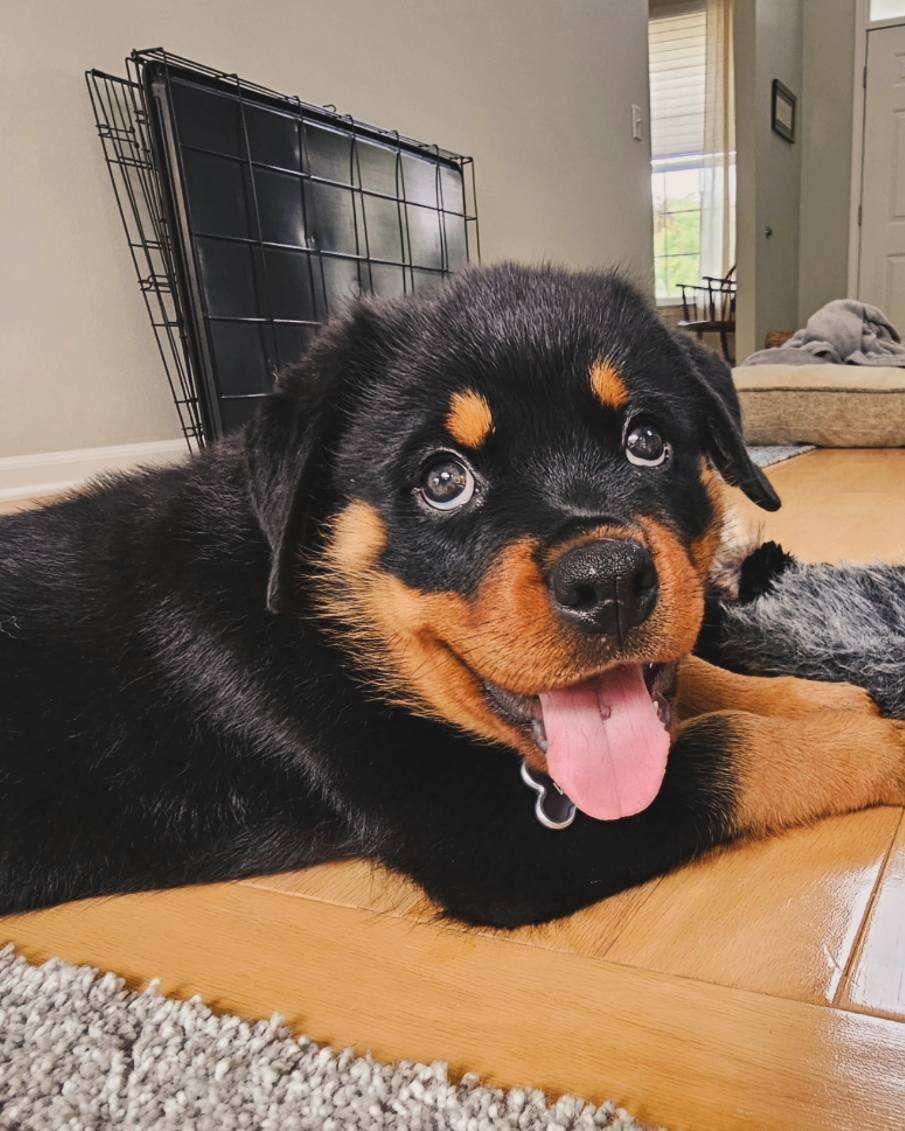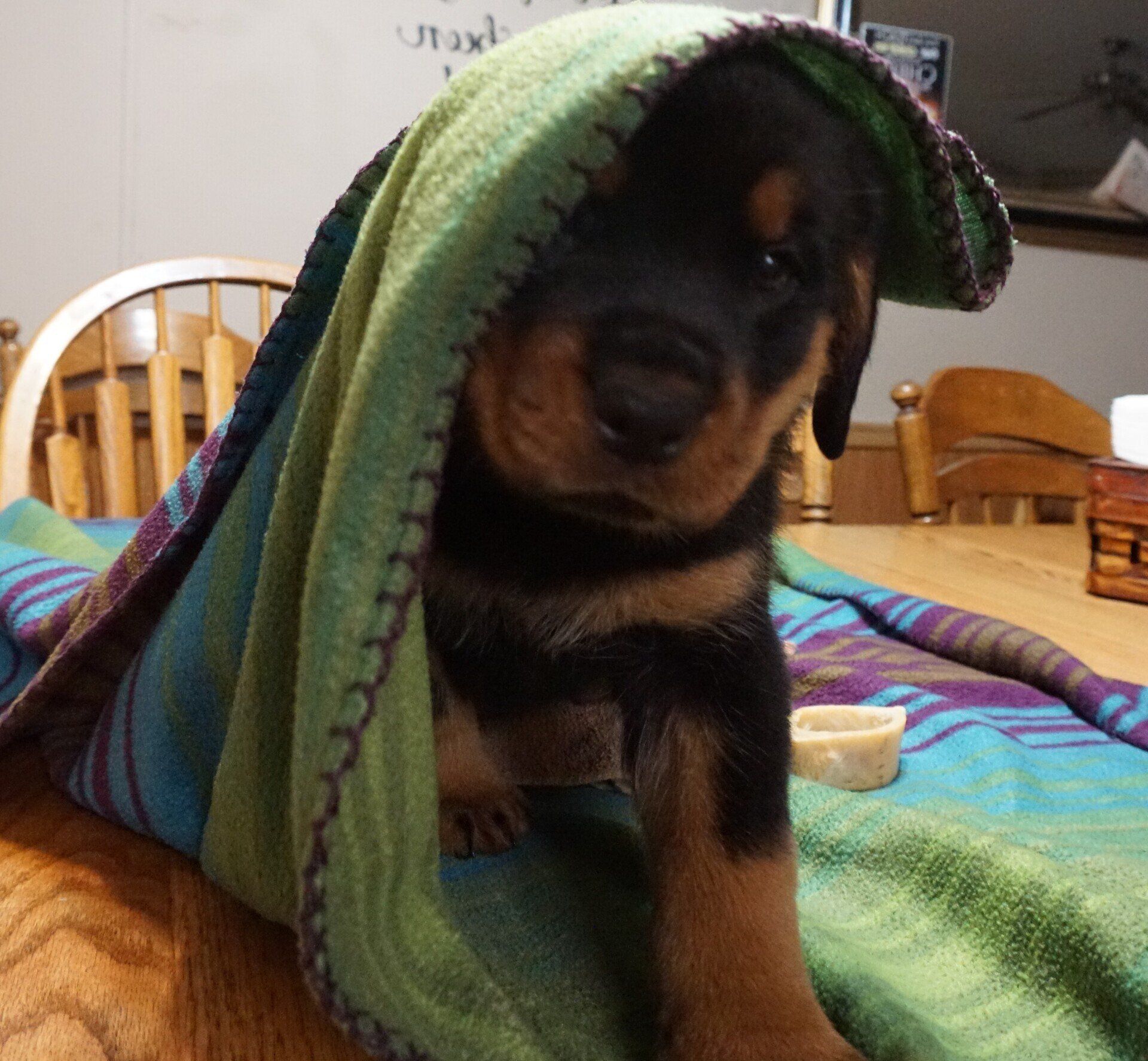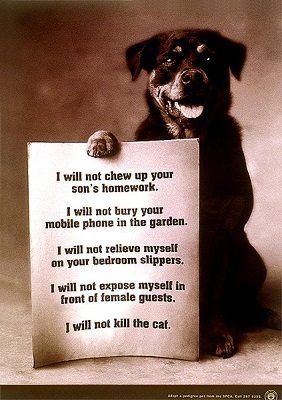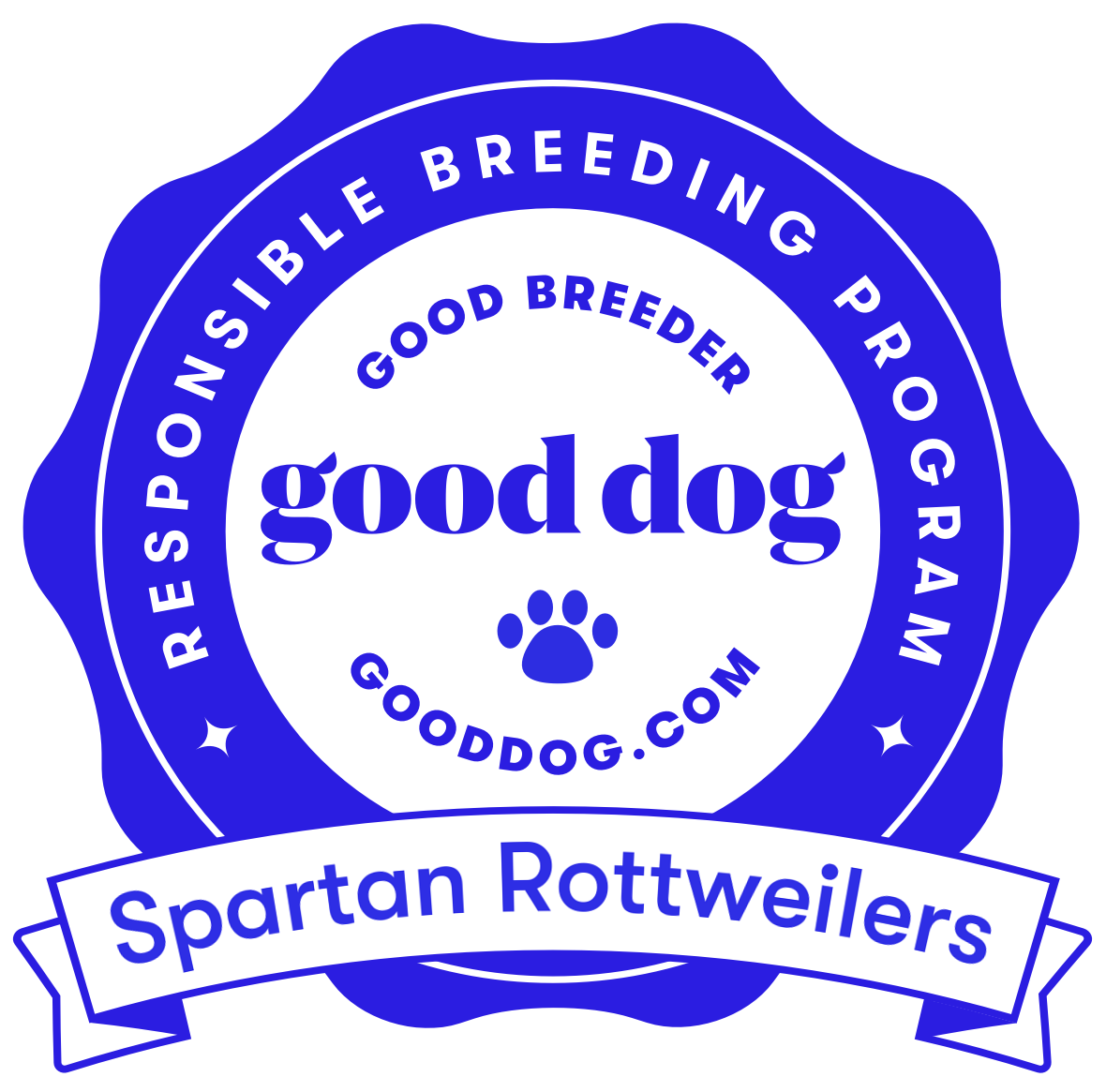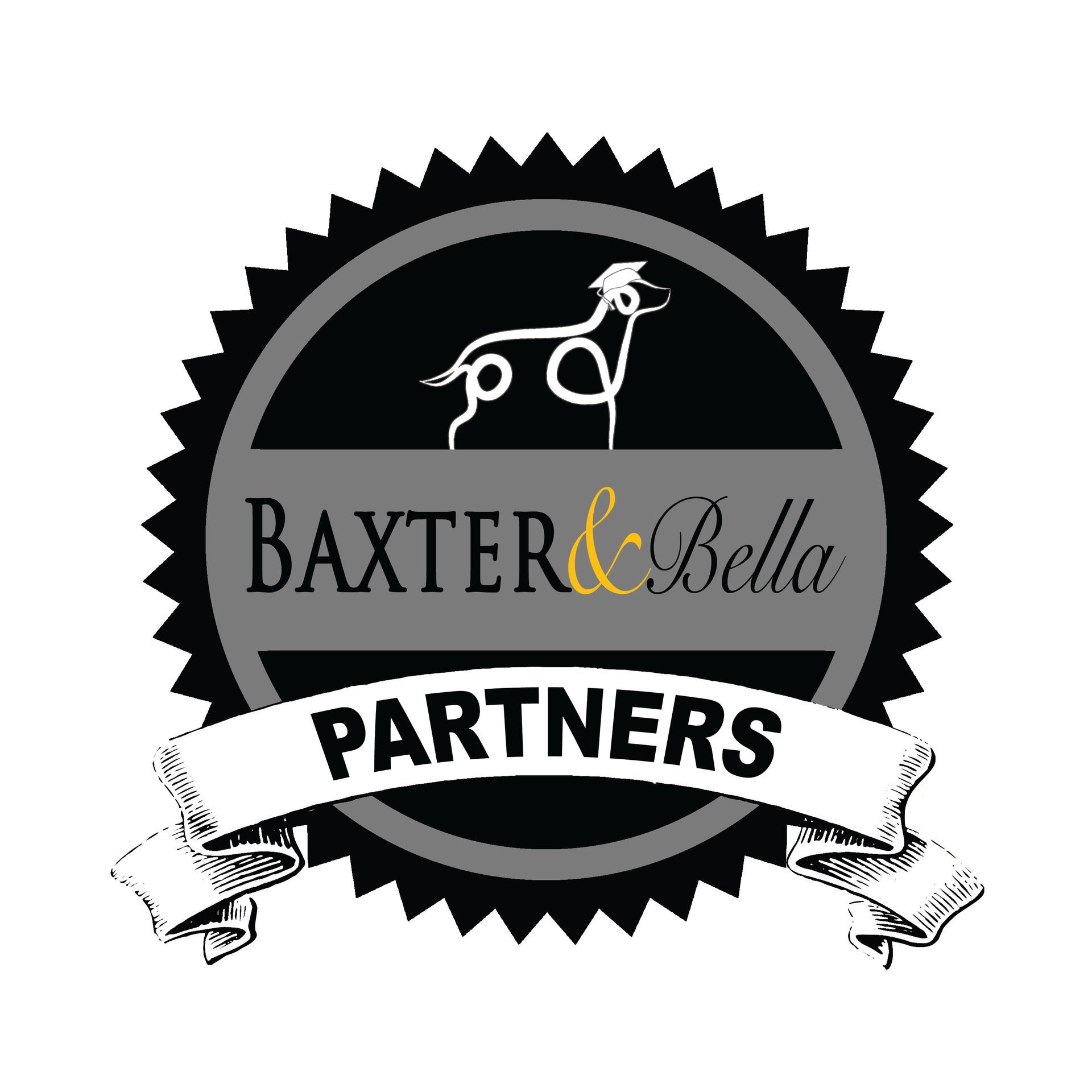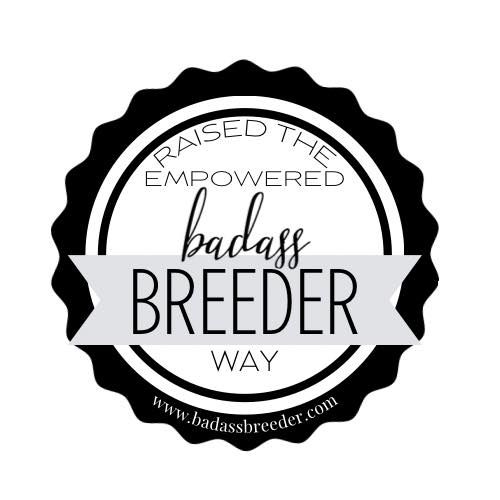Bringing your puppy home
What to Bring on
Puppy Pick-Up Day
Many new puppy families ask me what they should bring when coming to pick up their new Rottweiler puppy — besides all the excitement!
Here are a few helpful suggestions:
- A small travel kennel or crate for a safe ride home, especially if you’re driving a long distance
- A soft blanket or towel if your puppy will be riding on your lap — it adds comfort and helps them feel secure
- Paper towels or wet wipes — just in case of any little accidents on the way
- A water bottle and small bowl for hydration during travel
- A leash or slip lead for potty breaks on the way home
Your puppy will be ready for adventure, and this little bit of planning will help make the trip home smooth, safe, and memorable!
What Comes Home With Your Spartan Rottweiler Puppy
When you take your new puppy home, you won’t be going empty-handed! Every Spartan Rottweiler puppy goes home with a thoughtfully prepared take-home package that includes:
- 🧾 Receipt for Paid AKC Registration & Microchip Registration
- 🐾 Sample of Purina Puppy Food your puppy has been eating — to help with a smooth dietary transition
- 🩺 Vet Health Report from our licensed veterinarian
- 📄 State-Issued Health Certificate for travel or vet documentation
- 💉 Up-to-Date Vaccination & Worming Records
- 📡 AKC Reunite Microchipping — already registered for your peace of mind
- 🐶 Comfort Blanket carrying the scent of your puppy’s mama
- 🧸 Chew Toy with the familiar scent of littermates to ease the transition
- 📸 Weekly Photos & Videos documenting your puppy’s growth and milestones until Gotcha Day
- ❤️ And of course… your beautiful new puppy, raised with love and care!
This starter kit is designed to give your puppy comfort, security, and a great start as they adjust to their new forever home.
🛠️ Make Plans Before Your Puppy Comes Home
Bringing home a puppy is exciting — but don’t wait until they arrive to get ready! A little preparation will make the transition smoother for both of you.
👀 Get down on their level.
Literally — sit or lie on the floor and look around. You’ll be surprised at all the “toys” within paw’s reach! Wires, shoes, table legs… it’s a puppy playground unless you intervene.
🧼 Puppy-Proofing Basics
- Chewing is guaranteed.
Puppies love to chew — especially during that first year when they’re cutting teeth. If you don’t want something chewed, don’t leave it out. - Tie up or hide all electrical cords.
- Keep shoes in closets.
- Remove loose rugs, kids' toys, and anything dangling.
- Offer plenty of approved chew toys so they learn what’s theirs.
- Barricade with purpose.
Use baby gates or playpens to confine your pup to safe, easy-to-clean areas. They don’t need access to your whole house right away — freedom comes with trust and training.
🏠 Crate Training: A Comfort, Not a Punishment
- A crate or kennel is one of the best tools for raising a well-adjusted pup. It helps with potty training, keeps them safe when you’re not watching, and gives them a space to call their own.
- Dogs are den animals by nature. When introduced properly, a crate becomes a place of comfort and security.
- Make sure the crate is the right size — big enough to turn around, but not so large that they use one corner as a potty.
🚽 Potty Time Tips
- Take your puppy out frequently — after sleeping, eating, playing, or excitement.
- Always go to the same spot outside. The smell reminds them why they’re there.
- Praise and treat when they go potty in the right place — they’ll catch on fast with consistency and encouragement.
🍖 Treats & Training
- Start simple training on day one with rewards-based teaching. Sit, come, and watch-me are great beginner commands.
- Stock up on small, tasty treats. Use them for everything — training, socializing, and even redirecting from unwanted behavior.
🩺 Vet Visit
- Schedule your puppy’s first vet visit within 3 days of bringing them home.
- Your vet will check their health, set up a vaccination and deworming schedule, and give you expert guidance tailored to your pup.
🐾 Helpful Hints for Welcoming Your New Rottweiler Puppy
Adapted from AKC guidelines — with notes from Spartan Rottweilers
Bringing a new Rottie home is incredibly rewarding — and being prepared makes the transition easier for both of you. Here's a complete guide to get started:
🛒 Go Shopping: Essentials Before Puppy Comes Home
It’s important to have everything ready before your new puppy arrives. The following items should be on your list:
- Crate – Choose a crate that’s big enough for your puppy’s adult size, but not too big at first. If there’s too much space, your puppy may use one end as a potty area, setting house-training back.
- Collar & Leash – Include an ID tag with your contact info. Depending on your dog's activity level, a harness may help with leash training.
- Food & Bowls – Get high-quality puppy-specific food and two sturdy bowls (one for food, one for water).
- Exercise Pen or Baby Gates – These help create a safe space for your puppy as they explore your home.
- Chew Toys – Puppies will chew, especially when teething. Offer a variety of toys that are durable and safe (nothing too small!).
- Grooming Tools – Start early with brushing and nail trims so your puppy gets used to the process.
- Treats – Training starts from day one! Use soft, healthy treats to reward positive behavior right away.
🗂️ Pushing Paper: The Administrative Side of Puppy Ownership
Along with the cuddles and playtime, there are a few things to take care of on paper:
- Decide your puppy’s AKC registered name ahead of time.
- Make sure Spartan Rottweilers has:
- Your full name
- Mailing address
- Email and phone number
- Any co-owner’s information
- Your tail preference (docked or natural — either way is breed standard)
- This info is required for your paid AKC registration.
- Find a veterinarian, groomer, and pet sitter before you need them. Visit clinics, ask questions, and gather references.
- Learn the location of your nearest emergency vet clinic — just in case.
👋 Making Introductions: Helping Your Puppy Settle In
Your puppy is leaving behind everything they’ve ever known — mom, littermates, and the sounds and smells of our home. It’s a big adjustment! Here's how to ease the transition:
- Give a gentle tour. Show your puppy where to find their crate, food, and potty area. Let them explore safely, but don’t give them full run of the house right away. Freedom comes with trust and training!
- Supervise introductions to other pets. Keep interactions calm and brief at first. Let cats escape if needed. Be sure your older dog doesn’t feel overwhelmed.
- Introduce new people slowly. Everyone will want to snuggle your adorable pup, but too many hands and faces at once can be stressful. Socializing is important — just make it gentle and positive.
- Socialize, but be cautious. Until your puppy has had at least three sets of vaccines, avoid parks, pet stores, or other places where unvaccinated dogs may have been.
- Get creative with indoor socializing. Play new sounds (thunder, vacuum, kids playing), introduce different textures and surfaces (wood floors, rugs, grass), and provide toys with a variety of shapes and noises.
- Follow your puppy’s pace. Never force experiences. Encourage curiosity and celebrate small steps with praise or treats.
🎓 Teaching & Training: Start from Day One
Training isn’t just about rules — it’s about bonding. Every positive interaction builds trust and lays the groundwork for a well-mannered dog.
- Start potty training immediately. Take your puppy to the potty area frequently — especially after waking, eating, or playing. If accidents happen, clean thoroughly with an enzymatic cleaner to prevent re-marking.
- Start teaching your puppy how to walk on a leash. Not only will this aid in getting from point A to Point B, this also help instill that YOU are the leader.
- Set consistent house rules. Will your puppy be allowed on the couch? Who feeds and walks them? Everyone in your household should agree and be consistent.
- Teach simple commands. Start with basics like “Watch me,” “Sit,” and “Down.” Use treats and praise to reinforce good behavior.
- Enroll in a puppy class. Look for positive reinforcement-based classes in your area — or virtual options if available. These help with socialization and basic manners.
- Use training tools. The AKC S.T.A.R. Puppy Program is a great starting point. Once your pup completes a class with an AKC Approved Evaluator, they’re eligible for testing and a certificate.
- Set long-term goals. Aim for the AKC Canine Good Citizen title, which shows that your Rottie is well-mannered, socialized, and a joy to be around. It’s also the perfect foundation for advanced training or therapy work.
- Need extra help? Consider the AKC GoodDog Helpline, which offers live, professional training support over the phone.
